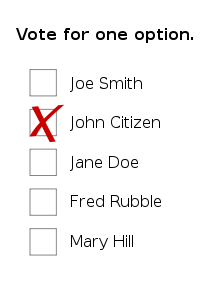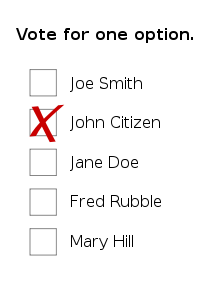Why Does Plurality Voting Fail?
Let’s just face it, there are many things wrong with the current way that the American public casts votes for their representatives in this Democracy. This article takes a look at a flaw in our voting system that has been apparent from the beginning. Plurality voting in a nutshell is destroying what it means to be an American Politician and extremely restricts the American voters in the deciding process as well as the actual vote.
 Number 4: The Spoiler Effect
Number 4: The Spoiler Effect
Anyone awake during the 2000 U.S. presidential election is aware of the spoiler effect. In that election, we had a candidate that didn’t win (Nader) who divided another candidate’s support (Gore). Without Nader’s presence, Gore would have won; but with Nader present, Bush won. It makes no sense for a candidate to enter the race—and lose!—yet change the winner. But that’s the kind of nonsense plurality carries out.
“It makes no sense for a candidate to enter the race—and lose!—yet change the winner.”Aaron Hamlin, Center for Election Science
Plurality voting is extremely sensitive to the spoiler effect. The “spoiler” candidate only needs to take away a little support from a similar candidate to sway the election. This happens because plurality only lets you choose one candidate. Because you can only pick one, voters are forced to divide their support among similar candidates.
The spoiler effect influences policy as well. It largely explains the U.S.’s draconian ballot access laws. Third parties and independents are often forced to quickly get many thousands — sometimes tens or hundreds of thousands — of signatures to get on the ballot.
To make matters worse, major parties then challenge those signatures to try to kick them off the ballot. In Pennsylvania, presidential candidate Ralph Nader was forced to pay court costs just for defending his own signatures. This heinousness plays out on the local level, too.
Why do major parties do this? Without a third or fourth candidate on the ballot, there’s no worry of a spoiler. Of course that also means voters don’t get options, but that’s not the major parties’ problem. So far, major parties have preferred to stifle competition and democratic speech than address the real culprit: plurality voting.
Read Full Article Here


